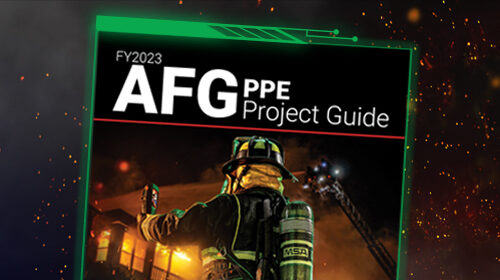
For months, grant writers in fire and EMS stations that apply to the Assistance to Firefighters Grant program anxiously await word on the status of their applications. As time goes by, those that don’t receive any notification begin to wonder if their application is going to be funded. Then, unsuccessful applicants begin to receive the dreaded turndown notices from FEMA.
After the initial shock and frustration wears off, applicants began the process of trying to determine why their application didn’t get funded. Here are some tips to help you understand why you may have been turned down in the past, and how to submit a successful AFG application.
THE AFG SCORING PROCESS
To understand your turndown notice you first need to understand the AFG scoring process and how far your application advanced in the system.
The initial review phase for every application is a computer review to score the request on how closely it is aligned with the AFG goals and priorities. If your application has a sufficient score, it is sent to a three-person peer review committee, which reads and scores your narratives. There are three groups who get rejected from AFG funding:
- The first group contains those who do not score high enough to be sent for review.
- The second group of turndown letters are those that make it to peer review but do not score high enough to be considered for funding.
- The third type of letters go to applicants who scored high enough in peer review for consideration, but the AFG program simply ran out of money before reaching those applications.
UNDERSTANDING THE NOTICE YOU RECEIVED
Every year, when turndown notices arrive, I hear the same complaints from applicants. They sound something like this:
- My turndown looks like a form letter.
- What was my score and is there a way to request my score?
- Is there any way to appeal this decision?
- Does FEMA offer any individual help?
Yes, your notice is very similar to everyone else’s. Given the number of notices that must be generated, some elements of yours, such as the initial introduction, are boilerplate. These paragraphs are simply an explanation of the AFG program and review process.
Because FEMA receives close to 10,000 applications, they simply are not able to develop individual rejection notices. Instead, the notices are developed around groups of applicants who applied for similar projects.
The next several paragraphs of your notice are generated using the sections of the AFG NOFO on which your application scored the lowest. Because these letters are based on groups of applicants, all the information in this section may not pertain specifically to your application.
It will, however, provide general areas where your application fell short. For example, if your notice states the following, “However, we can tell you that the peer review panel scores indicate that in order to help you obtain a higher score in a future AFG grant request, it is recommended that you review the portion of your application in which you addressed your department’s need for financial assistance and the inability to address the need without Federal assistance,” this statement is letting you know that your financial need narrative scored the lowest of all your narratives and needs improvement.
KNOWING YOUR AFG SCORE
Applicants do not receive their scores and there is no formal process to request them. Even if you knew your score, it wouldn’t do you any good anyway. It would be like telling you that Chicago scored four runs in last night’s game. Did they win? You wouldn’t know because you don’t know the other team’s score – the same is true with your AFG score. You wouldn’t know how you faired unless you knew everyone else’s score. Also, if you knew you scored an 89 and they funded everyone down to 90, then you would be lulled into a false sense of thinking that you only had to improve by one point – when in fact next year, the cutoff for funding might be a score of 92.
There is no way to appeal FEMA’s decision. In accordance with appeal procedure outlined in the Code of Federal Regulation, FEMA will only reconsider an application, “with respect to an initial grant award decision only when the applicant asserts that FEMA made a material technical or procedural error in the processing of the application and can substantiate such assertions.”
The citation further goes on to state that “as grants are awarded on a competitive basis … FEMA cannot consider a request for reconsideration based upon the merits of an original application. Similarly, FEMA will not consider new information provided after the submission of the original application.”
GRANT-WRITING RESOURCES
This year, FEMA initiated a series of webinars to review why applications did not make it to peer review. The seminar is very informative and can give you areas to investigate within your application for deficiencies. [NOTE: This article was originally published on November 14, 2017. Check the FEMA website for any scheduled AFG workshops and webinars.]
Finally, for applicants who have submitted a substantial number of applications without an award, FEMA does have mentoring services available. In the past, FEMA has considered applicants who failed to receive funding on five or six applications in a row to be eligible for a mentor.
This does not occur automatically. If you are interested, you must make an application through your regional FEMA office for a mentor.
This article reprinted with permission of FireGrantsHelp








